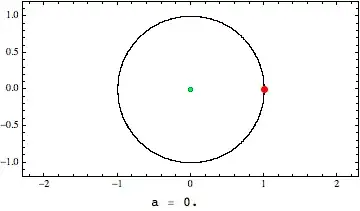Quite some years ago, I remember being asked the following question:
Suppose $\alpha = \sqrt{2+\sqrt{2+\sqrt{2+\ldots}}}$, what is $\alpha$.
The solution was given by squaring $\alpha$ and solving the arising equation $\alpha^2-\alpha-2 = 0$, to give $\alpha=2$ under the reasonable assumption that $\alpha$ has to be positive.
In the years after this, I passed on the question to new young and aspiring mathematicians, without giving it much thought. Recently, however, I spent some time thinking about it again and noticed some peculiar things.
If we generalise this question to the case where $\alpha = \sqrt{a+\sqrt{a+\sqrt{a+\ldots}}}$ for some $a\in\mathbb{R}$, I wondered how this would behave. We can still square this equation to obtain $\alpha^2-\alpha-a=0$ and thus $\alpha = \frac{1}{2}(1\pm\sqrt{4a+1})$. This is where the questions I have arise. First remark that the solution only makes sense for $a\geq -\frac{1}{4}$, if we want to remain in $\mathbb{R}$.
We saw before that for $a=2$, the choice for $\pm$ would be $+$. If we take $a=0$, we want $\alpha$ to be $0$ as well and so the choice there suddenly switches to $-$. I wonder if there's any intuitive explanation why the choice of solution for $\alpha$ would suddenly switch at $a=0$. (for $a>0$ the root is $>1$, so we will certainly want to choose $+$ for $\pm$)
The other strange thing that arises from the solution of $\alpha$ is that if $a=-\frac{1}{4}$ we would find $\sqrt{a+\sqrt{a+\sqrt{a+\ldots}}}=0$, which completely baffles me. What is the point that I'm missing? Is there something about convergence of $\sqrt{a+\sqrt{a+\sqrt{a+\ldots}}}$ that causes troubles that I so far fail to see?
(if you consider this question to be wrongly tagged, please alter the tas and remove this bracketed statement)
